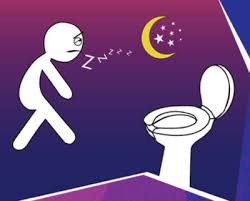
After drinking water, it normally takes about 10 to 15 minutes for the water to reach the intestines from the stomach. After it is absorbed by the intestines, it must be transferred to the kidneys through the blood, and the kidneys will then produce urine. Therefore, it takes about 40 minutes at the earliest to turn into urine; on average, 1 cc of urine produced in 1 minute is within the normal range. Generally speaking, the normal metabolism of water in the body takes between 30 to 45 minutes. If it cannot be excreted quickly, it will be abnormal. Moreover, due to the influence of drinking too much water, eating too salty food, and cold weather, after drinking water, you will feel more urge to urinate, and the amount of urination will increase. However, the need to get up to urinate after sleep is called “nocturia”. The problem of “nocturia” affects sleep and quality of life. If you see that your family members need to go to the toilet frequently after falling asleep every day, you need to pay more attention and remind you. Urine itself is not a serious disease, but it implies that there may be other problems in the body. There are 4 common causes of nocturia:
- The body produces too much urine during sleep: Normal people’s urine output throughout the day mainly occurs during the day. Nocturnal polyuria is defined as: the total amount of night urination is greater than 30% of the total daily urination, although the human body regulates the secretion of hormones by itself. As we age, the ability to secrete hormones gradually deteriorates, leading to insufficient antidiuretic hormone secretion in the body, leading to polyuria at night.
- The ability of the bladder to store urine is low: the bladder capacity is small or the male prostate is enlarged, the normal bladder capacity is about 400 to 500 ml, such as bladder fibrosis, will affect the bladder capacity, the bladder capacity will become smaller and lost Elasticity, no longer can hold as much urine as before; compression of female uterine fibroids may cause compression of the physiological structure of the bladder. In addition, disorders such as autonomic nervous system, bladder inflammation, spinal nerve compression, and psychological factors may cause the bladder nerves to lose stability, produce abnormal discharges and cause overactive bladder, which will cause nocturia.
- Medical diseases: Heart disease patients may have weaker heart. Therefore, blood is concentrated in the feet during the day, and the kidneys have less blood, so they produce less urine. Sleeping flat at night, the heart is more likely to hit the blood to the kidneys, so urine More liquid. In addition, diabetic patients have the three characteristics of “eating more”, “drinking more” and “urinating more”. In addition to drinking too much water, which leads to increased urine output, it may also be that high blood sugar damages the nerves, causing the nerves to fail to control the bladder. Therefore, the frequency of urination is higher than that of ordinary people.
- Sleep disorders: Patients with insomnia and sleep apnea are prone to nocturia. This is because when sleeping at night, the brain will greatly reduce the sensitivity of the bladder. The capacity of the bladder is much larger than that during the day, so as to avoid getting up and going to the bathroom all the time. Sleep. However, sleep apnea can lead to poor sleep, showing a state of waking and sleeping. In this case, the brain does not switch the urinary system to “sleep mode”, and the bladder is as sensitive as during the day, so people have to follow Like during the day, get up to go to the toilet every few hours. In addition, sleep apnea will lead to hypoxia. When the body finds hypoxia, it will speed up the circulation to compensate for the lack of oxygen. Therefore, it produces diuresis and causes polyuria at night. Suffering from sleep apnea, the brain is in a state of hypoxia in the middle of the night, which prevents the secretion of antidiuretic hormone, and the urine flows continuously from the kidneys to the bladder, so nocturia may occur. If you have problems with night snoring, or long-term insomnia, you need to treat this problem first, and the way of nocturia will logically improve together.
In addition to relying on drugs, nocturia can also change life and rest to relieve symptoms. The following 5 points are recommended:
- Reduce water intake 6 hours before going to bed, so that your body should not be too hydrated during sleep, so as not to produce too much urine.
- Before going to bed, whether you want to go to the bathroom or not, you must empty your bladder. Reduce the feeling of full bladder during sleep.
- Do not drink water after going to the toilet at night to avoid the next nocturia.
- Do not drink caffeinated beverages before going to bed.
- If you can, you can lie down at noon to help the urine to be excreted during the day.
Spooky2 also has a program to solve the problem of nocturia, as shown below:



